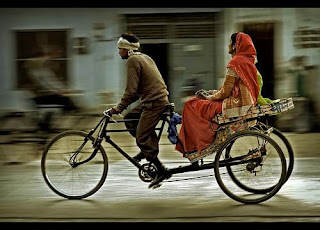The flags have been waved, the anthem has been sung, and the new currency will be in circulation next week: the Republic of South Sudan has been launched, and is off to who knows where?
Perdition, probably, for it is a “pre-failed state,” condemned by its extreme poverty, 15 percent literacy and bitter ethnic rivalries to more decades of violence and misery. But what about the country it leaves behind?
It’s telling that there is a South Sudan, but no North Sudan. What’s left is still just Sudan. It’s still the second-biggest country in Africa, and it still has four-fifths of the people it had before the south broke away. But it has lost a big chunk of its income: almost three-quarters of the old united country’s oil was in the south. It’s also an Arab country run by a leader who has been in power for 22 years. So we know what comes next, don’t we?
President Bashir seized power in a military coup in 1989, and he is the first serving head of state to be indicted by the International Criminal Court. In 2009, the ICC issued an arrest warrant for Bashir for war crimes and crimes against humanity in his conduct of the war in the rebellious province of Darfur. It added three counts of genocide last year. But he’s not all bad.
He inherited a much bigger war, between the north of the country and what is now South Sudan. It was a squalid, dreadful affair that killed about two million southerners and drove another four million — about half the southern population — from their homes. Bashir has a lot of blood on his hands. But he eventually realized that the south could not be held by force, and he had the wisdom and courage to act on his insight.
In 2005 he ended the fighting by agreeing that the two parts of the country would be run by separate governments for six years, after which the south would hold a referendum on independence. He knew that the south would say “yes” overwhelmingly — in the end, 98.83 percent of southern Sudanese voted to have their own country — yet he never reneged on the deal.
“President Bashir and (his) National Congress Party deserve a reward,” said Salva Kiir, now the president of South Sudan, after the votes were counted in February. And Bashir said: “We will come and congratulate and celebrate with you...We will not hold a mourning tent.” His decision made him very vulnerable politically in the north, but he stuck to it for all these years, and as a result many tens of thousands of people who would have died are still alive.
That doesn’t necessarily mean that north-south relations will be smooth after the South’s independence. Most of the oil is in South Sudan, but the new country is landlocked: the oil can only be exported through pipelines that cross Sudan proper to reach the Red Sea. Yet there is not a deal on revenue-sharing yet, nor even on the border between the two countries.
The dispute over the province of Abyei flared into open fighting between northern and southern forces last week, although there is now agreement to bring in an Ethiopian peacekeeping force. There is no agreement, however, on the referendum that was promised for the province but never held.
Abyei’s permanent population is mostly Dinka Ngok, who are Christian or animist by religion and “southern” in their loyalty. The north, however, insists that the Misseriya, Arabic-speaking Muslim nomads who bring their herds of cattle into Abyei to graze during the dry season, also have the right to vote in the referendum. Deadlock.
Such ethnic quarrels will persist and proliferate: at least five rebel groups are fighting the new southern government, and Bashir’s regime faces big rebellions in Darfur, South Kordofan and Nile Province. South Sudan will almost certainly end up as a one-party state that spends most of its revenue on the army — “the next Eritrea,” as one diplomat put it — but the future of Sudan itself is harder to foretell.
Bashir’s immediate problem is economic. The deal to split the oil revenue equally between north and south lapsed with South Sudan’s independence, and he is bringing in harsh austerity measures and a new currency as part of a three-year “emergency program” to stabilize the economy. But the price of food is already soaring in Khartoum as confidence in the Sudanese pound collapses.
Unaffordable food was a major factor in the popular revolts against oppressive Arab regimes in recent months, and Bashir is trying to insulate himself against that by promising stricter enforcement of Islamic law in Sudan. That may win him some support among the Muslim, Arabic-speaking majority, but by the same token it will further alienate the north’s remaining religious and ethnic minorities. So more rebellions in the outlying regions.
On top of all that, Bashir will forever be seen, however unfairly, as the man who “lost” the south. His status as an indicted war criminal does him no harm with the majority population at home; his failure to crush the southerners by force is what really undermines him. So he may soon have to go abroad and live with his money.
He did one good thing in his life, and no good deed goes unpunished.
© 2010 Arab News
 Bookmark, remember and visit us again: www.lankapolity.com
Bookmark, remember and visit us again: www.lankapolity.com








